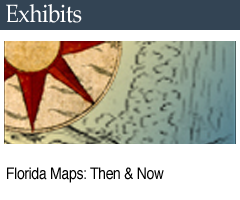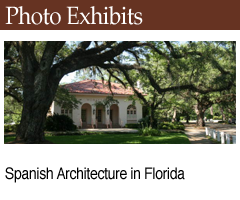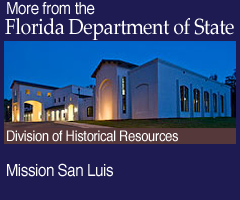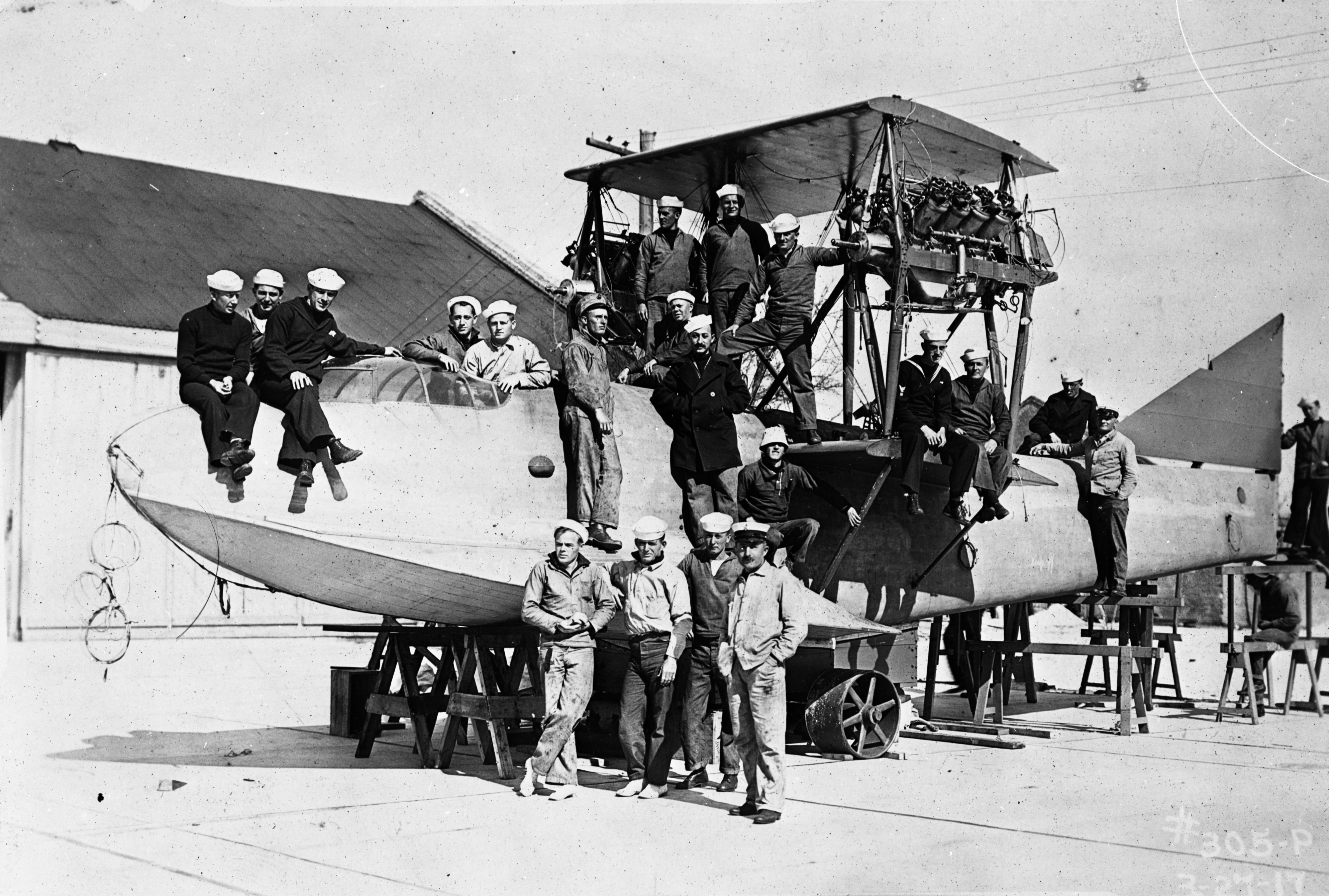Spanish Land Grants
WPA History of the Spanish Land Grants
The following is the original Introduction to the Spanish Land Grants in Florida, a five-volume transcription and abstraction of the Spanish land grants created and published in 1942 by the WPA's Florida Historical Records Survey, under supervision of the State Library Board. While historian Louise Biles Hill wrote the Introduction specifically as a guide for readers of that original publication, it is still useful as an extensive history of the creation, use and preservation of the Spanish land grants. Until the State Archives of Florida made them available online, the WPA's publication was the main source for researchers on the Spanish land grants and the Second Spanish Period Florida (1783-1821). For more recent research on these materials and the Second Spanish Period, see Published Works.
Contents
- Introduction
- The Spanish Archives
- British Land Grants in Florida
- Spain's Land Policy
- Board Of Commissioners--West Florida
- Board Of Commissioners--East Florida
- Final Disposition Of Land Claims
- Reasons For Non-Confirmation
Board Of Commissioners--West Florida
By Article VIII of the treaty of February 22, 1819, whereby Spain ceded the Floridas to the United States, all Spanish grants of land made prior to January 25, 1818, the date on which the King of Spain definitely expressed his willingness to negotiate, were to be "ratified and confirmed to the persons in possession of the lands, to the same extent that the said grants would be valid if the territories had remained under the domain of his Catholic Majesty." Owners in possession of such lands who, by reason of the recent circumstances of the Spanish nation and the revolutions, had been prevented from fulfilling all the conditions of their grants, were to be permitted an equal time to complete them after the date of the treaty. Grants subsequent to January 24, 1818, were to be considered null and void. (70) The treaty was not ratified and proclaimed until February 22, 1821 (71) and yet another year passed before a permanent territorial government was established in Florida by the Act of March 30, 1822. (72)
_______
69. G&S, V, 742, 751-754
70. F.N. Thorpe, Constitutions, Colonial Charters, and Other Organic Laws…(Washington, 1906-1909), II, 652.
71. Ibid., II, 649 n.
72. U.S. Stat. at Large, III, 654-659.

p. xxxiii
On May 8, 1822, Congress passed what proved to be the first of a series of Acts designed to carry out the provisions of Article VIII of the treaty of cession. The Act provided for the appointment by the President of three commissioners who on or before the first Monday in July, 1822, should open an office at Pensacola for the adjudication of land claims in West Florida. They were to hold sessions also at St. Augustine, for the purpose of passing on similar claims in East Florida. The sessions were to terminate on June 30, 1823, when the commissioners should forward to the Secretary of the Treasury, to be submitted to Congress, a record of all they had done and deliver over to the surveyor all archives, documents, and papers in their possession.
The commissioners were authorized to appoint a suitable and well qualified secretary, acquainted with the Spanish language, who should record in a well-bound book their acts and proceedings, including claims admitted and rejected, with the reason for their admission or rejection.
Persons claiming title to lands under any patent, grant, concession, or order of survey, dated prior to January 24, 1818, which were valid under the Spanish government, or by the law of nations and which were not rejected by the treaty ceding the Floridas to the United States, (73) were instructed to file their claims before the commissioners, with supporting evidence, and, where claimants were not the original grantees, with deraignment of title. Claims not filed before May 31, 1823, were to be null and void.
With reference to titles derived from British grants, the commissioners
______
73. The reference was in particular to the three large grants which the King of Spain made in 1820.—See G&S, V, 722-726.

p. xxxiv
were to consider only such as were claimed by citizens of the United States and which were valid under the Spanish government and had never been compensated for by the British government. (74)
To facilitate their inquiries the commissioners were authorized to administer oaths and to compel the attendance of witnesses, and were granted access to and the right to make transcripts of all public records relative to land titles. They were empowered to confirm all valid claims under 1,000 acres, but were directed to report to the Secretary of the Treasury, for the action of Congress, all testimony concerning claims in excess of that amount or of undefined quantity, with their opinion thereon, and the testimony concerning conflicting claims emanating from both the British and Spanish governments. (75)
The first meeting of the commissioners was held in Pensacola on July 15, 1822, with Samuel R. Overton and Nathaniel A. Ware present. Business transacted was the appointment of Joseph M. White as secretary, to whom written instructions were given concerning his duties, and the adoption of rules to be observed by all claimants. (76) Claimants were requested to file a written petition or notice setting forth the boundaries of the land claimed, evidence in support of their claims, and deraignment of title, together with a brief reference to the laws and
_______
74. The British government compensated its subjects in part for losses in Florida in consequence of the American Revolution and the cession of the province to Spain.
75. U.S. Stat. at Large, III, 709-718.
76. "Record Book A. Proceedings of the Board of Commissioners Showing Claims Presented and what papers were file din support of Same, West Florida, July 17, 1822 to July 24, 1824," pp. 1-2, cited hereafter as "Record Bk. A, W. Fla."

p. xxxv
ordinance under which the grants were made. (77)
The secretary was instructed: 1. to keep in the minutes "a record of the meetings and adjournments of the commissioners, with a statement of their proceedings and decisions accompanied by the evidence on which the decisions were made"; 2. "to record in their original language, all the papers necessary to the establishment of the title, with the reason of their admission or rejection," in the following order: notice or petition, notarial certificate of sales and transfers, mesne conveyances so abbreviated as to show the claim of title and date of transfer, the patent, grant, or concession, report of the surveyor as to whether the land was vacant, report of fisc. (78) stating whether there were any objections to the petition, order and certificate of survey and the plat (if the survey was executed prior to January 24, 1818); and 3. to file in his office, for the inspection of the commissioners when considering claims, all papers not recorded. The secretary was further instructed that translations would be confined to recorded papers and such other documents as the commissioners might from time to time require. (79)
Having organized and adopted rules of procedure, the commissioners were ready to receive claims. Few were forthcoming. Only four meetings, including the first, were held in July. A fifth session was held on August 16. Four days later the minutes record: "In consequence of the
_______
77. Ibid.
78. Fiscal, or King's Solicitor.
79. "Record Book A, W. Fla." P. 2

p. xxxvi
appearance of a malignant fever in the City of Pensacola, and the impracticability of either remaining in safety or of doing business, ordered that the Court be adjourned until further appointment." (80) It reconvened on October 4, only to adjourn until December 12.
Congress had not supplied the commissioners with published copies of Spain's land laws, nor indeed were copies easily obtained in this country. Throughout what came to be a three-year term the commissioners were handicapped in this particular. As late as November 12, 1824, they complained that they had been unable to obtain a copy of the ordinance of 1754 issued by Ferdinand VI and that very few settlers would answer questions concerning land laws and practices. (81) Not until Joseph M. White (82) complied from his experience as secretary and commissioner of the Board for West Florida and from published works, which he finally obtained from Spain, his "Spanish and France Ordinances Affecting Land Titles in Florida and Other territories of France and Spain" (83) was there an adequate guide for the adjudication of Spanish land claims in Florida.
On December 12, 1822, the Board issue an order "to summon the most respectable Spanish Inhabitants to give evidence in relation to the customs and practice of the Spanish Officers of the provincial Government" with reference to land grants, and four days later these
_________
80. Ibid., p. 17l Niles Register, Vol. XXIII, Oct. 19, 1822
81. DG, IV, 84
82. Joseph M,. White was a delegate to Congress from Florida, 1825-1837. He served as secretary to the Board of Commissioners during 1822 and as commissioner during 1823-1824. He was born in Kentucky, studied law and moved to Pensacola in 1821.
83. Published in G&S, V, 631-774.

p. xxxvii
citizens appeared before the Board. (84)
In all, nine sessions were held between July 15 and December 16, 1822 (85) It was evident that the date limits set forth in the Act of May 8, 1822, had not given sufficient time for the business in hand, and the commissioners apparently made no effort to comply with its provisions for holding sessions in St. Augustine.
On March 3, 1823, Congress provided for two Boards of Commissioners, who were to hold sessions in East and West Florida, at St. Augustine and Pensacola respectively, until the second Monday in February, 1824. Claimants were no longer required to produce in evidence deraignment of titles, and the commissioners were authorized to confirm claims up to 3,500 acres instead of 1,000 as provided in the law of 1822. District attorneys when required to do so were to attend sessions of the Boards for the purpose of arguing and explaining points of law. Claims not filed before December 1, 1823, were to be considered null and void. (86)
It required six weeks for the Act of March 3, 1823, to reach West Florida. A session of the Board was called for April 19, but only Samuel R. Overton was in the territory and present. (87) No further meeting
_______
84. "Record Bk. A, W. Fla.," p. 18
85. Ibid., passim.
86. U.S. Stat. at Large, IV, 6-7; Tipton B. Harrison, district attorney. For West Fla. In 1822, died and was succeeded in 1823 by William F. Steele. In East Florida Edgar Macon in 1823 succeeded Alexander Hamilton in that office, Hamilton having been appointed the previous year—Niles Register, Vol. XXII, May 18, 1822, P. 180. (Of great convenience to students of Florida history is the "Digest of Florida Material in Niles Register," 1939 in manuscript made by T. Frederick Davis in Jacksonville, to whom the editor is indebted for reference to that journal appearing herein.)
87. "Record Bk. A, W. Fla." P. 18.

p. xxxviii
was held for four months. On September 2 the Board was reorganized, Joseph M. White being sworn in to replace James P. Preston, resigned. Morris Hunter of Pensacola was appointed secretary to succeed White. (88)
The Board set itself the task of hearing claims for three town lots or two tracts of land each day (89) and met regularly until February 9, 1824, when, the time limit set for its sessions having expired, it adjourned "until further order" with its business still unfinished. (90) Its life was extended to January 1, 1825, by the Act of February 28, 1824, (91) and the commission reconvened with the same personnel on April 5, 1824. (92) On May 4 Craven P. Luckett succeeded Ware (93) and Overton failed to sit at any session recorded after May 20, (94) although he signed the reports of the Board to the Secretary of the treasury on November 12, 1824, and January 12, 1825. (95)
There is no record in the minutes of a session after July 19, 1824, but White and Luckett evidently continued to transact business during the remainder of the year and even subsequent to January 1, 1825, for an Act of Congress of April 22, 1826, legalized their activities after that date. (96) Afterwards the Register and Receiver for the Land Office of West Florida. (97) completed the work in which the commissioners for that
_______
88. Ibid., p. 30
89. Ibid.
90. Ibid., p. 226
91. U.S. State at Large, IV, 6-7
92. "Record Bk. A, W. Fla." p. 267
93. Ibid., p. 337
94. Ibid., passim.
95. DG, IV, 83-117, 118-157.
96. U.S. State at Large, IV, 156
97. Samuel R. Overton, Register for 1825, G.W. Ward for 1826. and Richard Keith Call, Receiver.

p. xxxix
district had for three years been engaged.


 Listen: The Assorted Selections Program
Listen: The Assorted Selections Program


